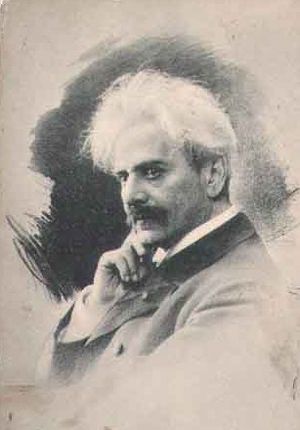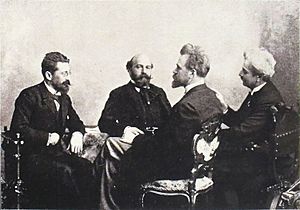David Popper facts for kids
David Popper (born June 16, 1843 – died August 7, 1913) was a talented Bohemian cellist and composer. He was known for his beautiful cello playing and for writing many pieces for the cello that are still popular today.
Contents
Life Story
David Popper was born in Prague, which is now the capital of the Czech Republic. He started learning music at the famous Prague Conservatory. He studied the cello with a teacher named Julius Goltermann and quickly became very good.
Early Career and Tours
In 1863, David Popper went on his first tour, playing the cello in different cities. In Germany, a famous musician named Hans von Bülow praised him. Bülow was the son-in-law of the well-known composer Franz Liszt. Because of this praise, Popper got a special job as a "Chamber Virtuoso" for Prince von Hohenzollern-Hechingen in Löwenberg. This meant he was a special musician who played for the prince.
In 1864, he played a new cello concerto by Robert Volkmann for the first time with the Berlin Philharmonic orchestra. He lost his job with the prince a few years later when the prince passed away.
Vienna and Marriage
David Popper made his first big appearance in Vienna, Austria, in 1867. He became the main cellist at the Hofoper, which is a very important opera house. From 1868 to 1870, he also played in a group called the Hellmesberger Quartet.
In 1872, he married Sophie Menter, a talented pianist who was also a student of Franz Liszt. They started touring together, giving concerts all over Europe. This was a very busy time for them. In 1873, Popper left his job at the Hofoper so he could travel and perform even more with his wife. Their marriage ended in 1886.
Teaching and Later Years
In 1886, Franz Liszt suggested David Popper for a teaching job. This was at the new string department of the Conservatory in Budapest, Hungary. In Budapest, Popper joined another group called the Budapest Quartet with a musician named Jenő Hubay.
He also played chamber music (music for small groups of instruments) with the famous composer Johannes Brahms more than once. They even performed Brahms's Piano Trio No. 3 for the very first time in Budapest in December 1886.
David Popper passed away in Baden, a town near Vienna, in 1913.
His Students and Cello Style
Many talented cellists studied with David Popper. Some of his notable students included Arnold Földesy, Jenő Kerpely, and Adolf Schiffer.
Interestingly, David Popper was one of the last great cellists who didn't always use an endpin. An endpin is the spike at the bottom of a cello that rests on the floor. An old drawing from 1880 shows that he started playing without one, but he did begin to use it later in his life.
Musical Works
David Popper wrote a lot of music for the cello. He composed four concertos, which are pieces for a solo instrument and orchestra. He also wrote a special piece called Requiem for three cellos and orchestra in 1891.
He is especially famous for his many shorter, exciting pieces that are still played today. These pieces show off the unique sound and style of the cello. Some popular ones include:
- Tarantella
- Spinnlied (Spinning Song)
- Elfentanz (Dance of the Elves)
- Ungarische Rhapsodie (Hungarian Rhapsody)
Popper also wrote music to help students learn the cello. His most famous teaching book is called High School of Cello Playing (Op. 73). It's a collection of cello études (practice pieces) that advanced cello students use all over the world.
An old music dictionary, the Grove Dictionary of Music and Musicians, once described his playing by saying: "His tone is large and full of sentiment; his execution highly finished, and his style classical." This means he had a big, emotional sound, played very skillfully, and had a traditional, elegant style.
Selected Compositions
Here are a few examples of his many works:
- Op. 8, Concerto No. 1 in D minor, for cello and orchestra
- Op. 24, Concerto No. 2 in E minor, for cello and orchestra
- Op. 33, Tarantella, for cello and piano
- Op. 39, Dance of the Elves, for cello and piano
- Op. 50, Im Walde (In the Forest), Suite for cello and orchestra
- Op. 55, Pieces for cello and piano, including Spinning Song
- Op. 59, Concerto No. 3 in G major, for cello and orchestra
- Op. 66, Requiem, for three cellos and piano (or orchestra)
- Op. 68, Hungarian Rhapsody, for cello and piano
- Op. 72, Concerto No. 4 in B minor, for cello and orchestra
- Op. 73, High School of Cello Playing: Forty Études for Cello Solo
See also
 In Spanish: David Popper para niños
In Spanish: David Popper para niños
 | Aurelia Browder |
 | Nannie Helen Burroughs |
 | Michelle Alexander |



